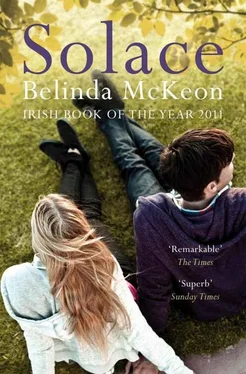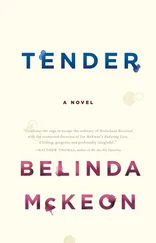His father had believed, for a while, that he had been named after Tommy; that was how close he had felt to him when he was a boy. He had told Mark about it; how he had spent so many hours every day with Tommy, helping him out on the farm. How he had annoyed his own father, the grandfather Mark had never known, by wanting to work with Tommy rather than with him. For Mark, Tommy was just there, and then one day he was just not, and he could still remember the shock of seeing his father cry at Tommy’s funeral. It had been like watching a wall of the house fall away.
Frank and Irene Lynch had been at that funeral. Frank Lynch had laughed when, imitating his father, Mark had laid his hand out for a shake in the graveyard. Lynch had put his hand on Mark’s head instead, had ruffled his hair, had told him that he had to be his father’s companion now. His father had said that he was more of a hindrance than a help. Lynch had laughed again and said that he didn’t believe it for a minute, and then he had moved closer to Mark’s father and the two of them had got into a long conversation about the other people who were standing around the grave.
It was probably the last civil conversation his father and Lynch had ever had, that one; afterwards, very soon afterwards, the trouble had begun. At the time, to Mark, it had seemed just a blur of shouting and cursing. Of silences at the dinner table. Of slamming doors. It was only years later that he understood what had happened; understood just how deeply his father felt he had been betrayed. Tommy had promised his father the farm. He had involved Tom in decisions about the future of the place. He had encouraged him to graze his own cattle on the land behind the cottage. He had encouraged him to save hay from the meadows. And he had never bothered himself to make a will.
Tom had asked Frank Lynch to look into the matter of the will, and when it emerged that there was none, he asked Lynch to advise him on what would happen next. Lynch told him that, by law, everything would go to Tommy’s nearest surviving relative, and that he would be happy to find out who that was. Shortly afterwards, he phoned Tom to say that the relative had been found: a cousin in Chicago, whom Tommy had never met. Lynch wrote to the cousin, and the cousin wrote back to say that he was touched and honoured by the inheritance. He was proud of his Irish ancestry, he said, and he was praying for the soul of his cousin Tom. And as soon as the ownership was legally transferred to him, he was putting the farm up for sale, and in this he wanted Lynch to act for him, because he could tell by the tone of his letter, by the kind sympathies it had expressed, that Lynch was an honourable man. When Lynch phoned Tom the same evening, it was to tell him that the auction would take place in Tommy’s yard. When Lynch’s secretary phoned Tom the next morning, it was to instruct him to remove his cattle from Tommy’s land. Bewildered, Tom refused. Overnight, Lynch had the cattle taken from the land. Mark would never forget his father’s face that morning when he came in the back door. It was rage and it was incomprehension. But most of all it was fear. His hands were shaking too much for him to be able to pick up the phone. Maura had to make the call. The cattle, it turned out, were being held in a pound near Cavan. There would be a fee for their return, and if they were placed back on the estate of Tommy Burke, the further consequences would be much more serious.
At the auction, Tom tried to bid, but he could go nowhere near the price offered by the highest bidder. The highest bidder was eighteen years old. He was not yet out of secondary school. But he won the place easily. And to Frankie Lynch’s credit, he had come over, after the bidding had ended — Mark had seen it — and tried to shake Tom’s hand. But Tom had turned. The older boy had looked at Mark and shrugged before going back to where Frank Lynch stood, chequebook in hand.
She wouldn’t remember it. There would have been too many people who despised her father, too many people he had wronged, for her to make note of anyone in particular. And by the time she had come to her own conclusions about the crooked fucker that her father was, the falling-out with Tom would have been far into the past.
The bell over the shop door rang as Mark pushed it open. He walked to a shelf of foil-topped bottles as though he knew what he was doing. When the guy behind the counter called over to offer his assistance, Mark explained to him what he had in mind.
Elizabeth Lefroy turned out to look nothing like Joanne had imagined. There were no scarves and jewels and shawls. She wore a simple dark suit over a cream blouse, with a gold pin on the lapel. She wore glasses, and her silver hair was pulled into a tight bun. She was tall and thin. She resembled, more than anyone, the nun who had been principal of Joanne’s boarding school.
Joanne sat with Imelda, facing their barrister, Linda O’Halloran, and took notes as Glackin, the barrister for the plaintiff, made his closing arguments. He took his usual approach, clearly trying to wring as much pity as possible from the judge. This woman was broken, he appealed in his final summation. This woman had been betrayed at a time of her life when she should have been looked after, should have been thanked for all she had done. She was just another of the elderly Irish men and women, he said, who were now at risk of being abandoned and forgotten by her state. He warned, too, against the temptation to scapegoat a woman like Mrs Lefroy, the widow of a British army officer, for her connection to a time that was now past, to punish her for things that were long over, for having led a life with privileges and power that some would resent. He had shown beyond all doubt, he said, that Elizabeth Lefroy’s son had broken the law, had changed and indeed destroyed a property without the consent of that property’s rightful owner. That was what the case came down to — a simple matter of permission and authority and of trust.
‘Of trust,’ he said, eyeing Rupert Lefroy, and he thanked the judge.
‘Jesus Christ,’ breathed Imelda, as Glackin took his seat. ‘That’s a trip to the parish pump the judge isn’t likely to forget.’
Linda O’Halloran stood. She demolished Glackin’s arguments in minutes. She mocked their provincialism, exposed their presumption, and reminded the court that the case was a question of property law; that her client had broken no law and transgressed no authority. Sympathy and sentiment, she warned, had no place in a court of law. It did no disrespect to a person to follow the rule of law, regardless of the age or the stage of life of that person; on the contrary, one did disrespect to a person to assume that, just because that person happened to be an elderly woman, she should be treated differently, should be afforded certain liberties.
‘There are loyalties, there are longings, and then there are laws,’ O’Halloran said, as she addressed the judge for a final time. ‘We all have mothers. Most of us love our mothers, want the best for our mothers; many of us have lost our mothers, and would do anything to have them back with us. But, Judge, we must be wary of the dangers of sentiment. We must listen to the facts. The facts are: my client was given this property to do with as he pleased. It was a useless property, nothing more than a shed, and he made of it a booming business, a contribution to his city and to his community. We have heard his testimony, which has been honest, patient and full of reason. We have heard, too, the testimony of my client’s mother, which has been — as have been the questions and statements of her counsel — emotive, unreasonable and contradictory. This testimony has made much of the matter of duties, of obligation, of what is right and proper, of where our loyalties should finally lie. My loyalties lie, Judge, with the law, the law as it is set down in the statutes of this country — with laws that are fair, and reasonable, and which have the best interests and the rights of the people of this country at their core.’
Читать дальше












